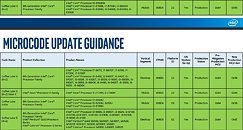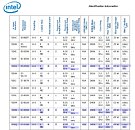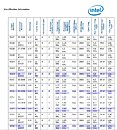Raevenlord
News Editor
- Joined
- Aug 12, 2016
- Messages
- 3,755 (1.20/day)
- Location
- Portugal
| System Name | The Ryzening |
|---|---|
| Processor | AMD Ryzen 9 5900X |
| Motherboard | MSI X570 MAG TOMAHAWK |
| Cooling | Lian Li Galahad 360mm AIO |
| Memory | 32 GB G.Skill Trident Z F4-3733 (4x 8 GB) |
| Video Card(s) | Gigabyte RTX 3070 Ti |
| Storage | Boot: Transcend MTE220S 2TB, Kintson A2000 1TB, Seagate Firewolf Pro 14 TB |
| Display(s) | Acer Nitro VG270UP (1440p 144 Hz IPS) |
| Case | Lian Li O11DX Dynamic White |
| Audio Device(s) | iFi Audio Zen DAC |
| Power Supply | Seasonic Focus+ 750 W |
| Mouse | Cooler Master Masterkeys Lite L |
| Keyboard | Cooler Master Masterkeys Lite L |
| Software | Windows 10 x64 |
Following all of the unofficial, tentative tidbits of information following Intel's on-again, off-again 9000 series CPU lineup (which still belongs to the 8th Generation), we now have official confirmation - as is usual, through Intel's documentation. In this instance, the "culprit" is Intel's Microcode Revision Guidance. The Coffee Lake S series featuring 6+2 configurations are now listed with Core i5-9600(K), Core i5-9500(T) and the Core i5-9400, while the Core i3-9100 and Core i3-9000 SKUs are listed with a 4+2 configuration.
Update: Intel's 8th Gen Specification Update now lists clocks and core count for the aforementioned CPUs. Overall, there's an increased 100 or 200 MHz Max Turbo frequency across the board within the same TDP package, and some instances of 100 MHz base frequency increases over Intel's 8000 series CPUs (can't just call them 8th gen anymore now can we?). The 9600K, for example, increases base clocks from the 8600K by 100 MHz (up to 3.7 GHz base), but pole-vaults its predecessor in maximum Turbo (up to 4.5 GHz).



Intel's strategy for its top-tier i7 remains somewhat of a mystery: on one hand, Intel could very well keep their 8000 series' tiering scheme, with i7 models featuring 6 cores but 12 threads via Hyper Threading, thus differentiating from the 6-core, 6-thread i5's. But recent events have made it more likely that the company is planning on introducing its i9 tier to the mainstream desktop market. For now, an 8-core, 16-thread CPU (Intel Core i9-9900K); a 6-core, 12-thread one (Intel Core i7-9700K) and a six-core, six-thread part (Intel Core i5-9600K) fall in pretty nicely with Intel's Microcode Update Guidance and 8th gen specification updates.
View at TechPowerUp Main Site
Update: Intel's 8th Gen Specification Update now lists clocks and core count for the aforementioned CPUs. Overall, there's an increased 100 or 200 MHz Max Turbo frequency across the board within the same TDP package, and some instances of 100 MHz base frequency increases over Intel's 8000 series CPUs (can't just call them 8th gen anymore now can we?). The 9600K, for example, increases base clocks from the 8600K by 100 MHz (up to 3.7 GHz base), but pole-vaults its predecessor in maximum Turbo (up to 4.5 GHz).



Intel's strategy for its top-tier i7 remains somewhat of a mystery: on one hand, Intel could very well keep their 8000 series' tiering scheme, with i7 models featuring 6 cores but 12 threads via Hyper Threading, thus differentiating from the 6-core, 6-thread i5's. But recent events have made it more likely that the company is planning on introducing its i9 tier to the mainstream desktop market. For now, an 8-core, 16-thread CPU (Intel Core i9-9900K); a 6-core, 12-thread one (Intel Core i7-9700K) and a six-core, six-thread part (Intel Core i5-9600K) fall in pretty nicely with Intel's Microcode Update Guidance and 8th gen specification updates.
View at TechPowerUp Main Site



